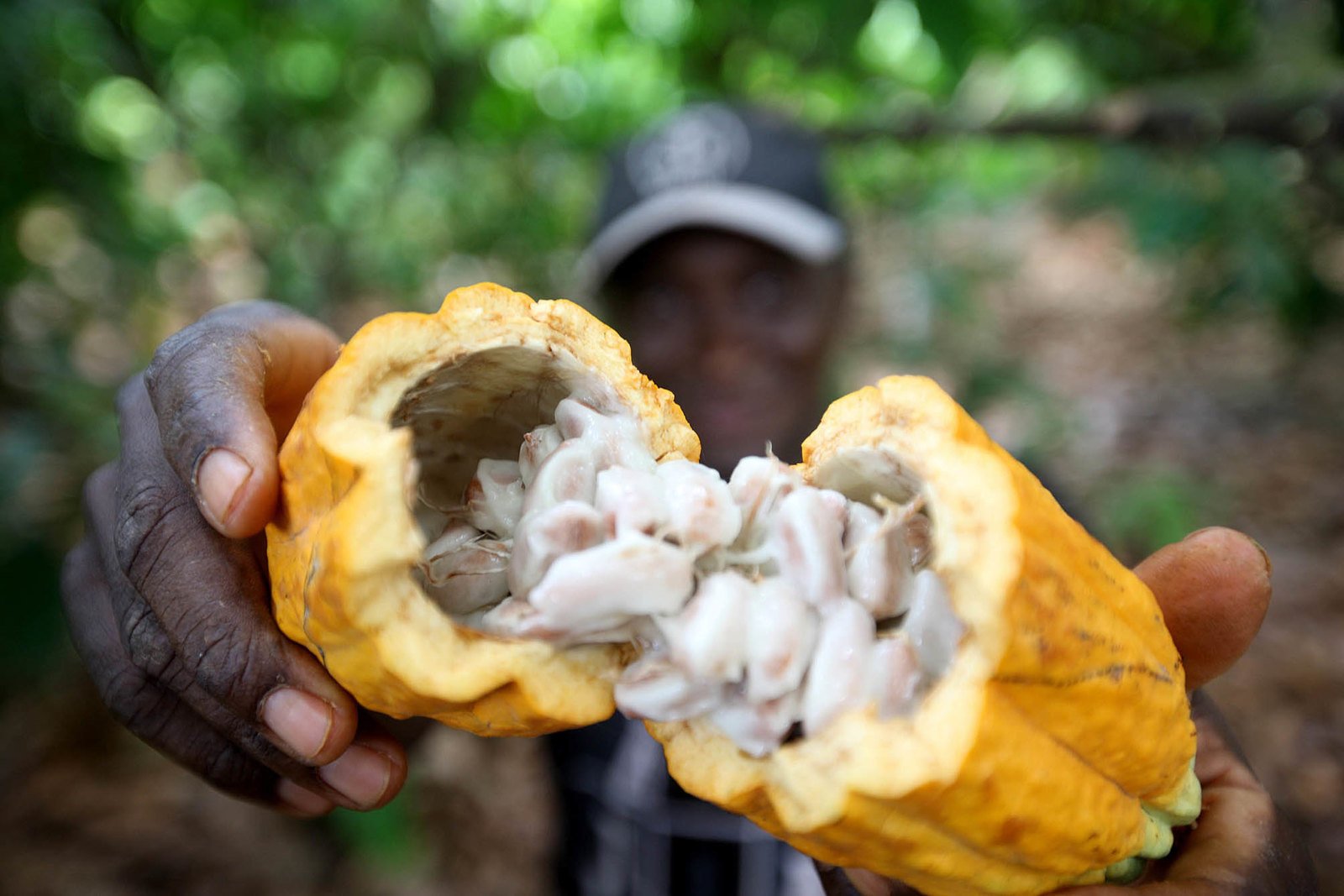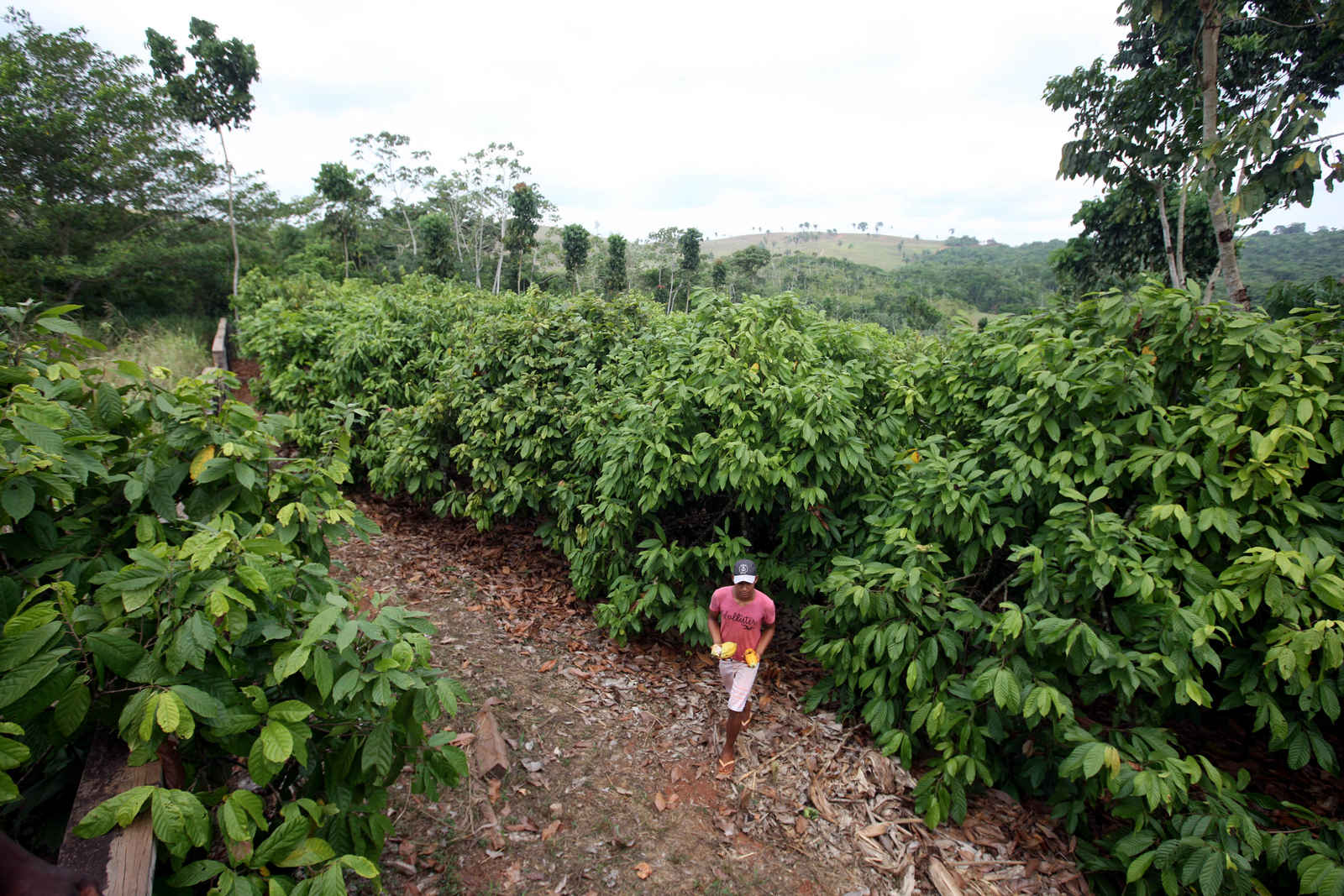Two multinationals bought cocoa beans from a supplier employing slave-like labour in the state of Bahia. In investigations conducted by the Labour Prosecution Service (MPT), Repórter Brasil found a series of labour violations in the supply chains of Olam International and Barry Callebaut. A third agribusiness giant also benefited from ‘dirty cocoa’: Cargill.
The three foreign companies account for 97 percent of the grinding and roasting of cocoa beans in Brazil and supply major chocolate brands such as Nestlé and Lacta (Mondelez) – manufacturers of the popular Brazilian chocolate brands ‘chokito’ and ‘sonho de valsa.’ But before becoming a treat in the hands of consumers, Brazilian cocoa experiences a sad reality in rural areas.
At least 148 people have been rescued from slave labour on cocoa farms in the past 15 years. Many operations took place in the states of Pará and Bahia, the largest cocoa hubs in Brazil. Human rights violations also include threats from employers, degrading housing and hygiene conditions, debt bondage, and even child labour.
According to the Labour Prosecution Service, the two central figures in this chain of crimes are farm owners and the so-called ‘middlemen’ – intermediaries who serve as links between owners and large mills.
One of the farms caught with slave labour belongs to Chaves Agrícola e Pastoril, a company that owns several cocoa estates in southern Bahia. In September 2017, labour inspectors from the Ministry of Economy rescued nine people in a slave-like situation at the Diana Farm in Uruçuca (BA).
According to inspectors, the farm kept workers in poor accommodation, without access to bathroom facilities or drinking water. They used to bathe in a pond of still, murky water. In order to drink and cook, they had to strain the water collected from wells to remove tadpoles and fish.
According to prosecutors’ findings at the time of the inspection, the cocoa harvested by the Chaves Group was traded with different middlemen in the towns where the company had farms. Repórter Brasil had access to invoices from their businesses. The documents confirm that, at the time of the rescue, at least two large mills – Barry Callebaut and Olam Agrícola – were buying cocoa from a middleman supplied by farms belonging to the Chaves group.
Barry Callebaut said that its relationship with Chaves Agrícola e Pastoril was interrupted in June 2019, after it found violations to its supplier code of conduct.

Olam Agrícola, in turn, did not comment on the use of slave labour in its supply chain nor did it say whether it had taken action regarding the Chaves group. However, it stated that it has monitoring systems in place to protect human rights.
Mondelez, owner of Lacta, acknowledged the challenges it faces to establish good working conditions in plantations. Nestlé said it buys cocoa directly from mills. The two chocolate makers say they reject bad labour practices.
In 2018, just a few months after the crime was found, the Diana Farm and other estates belonging to the Chaves Group received the seal of good practice from UTZ, the main international certifier of labour and environmental sustainability in the segment. The certificate, however, is no longer valid. Asked about the date and reasons for its cancellation, UTZ did not respond (see the companies’ full statements).
In April 2020, as a result of the operation, Chaves Agrícola e Pastoril was included in the ‘dirty list’ of slave labour, an official register of the Ministry of Economy that exposes employers caught using slave-like labour. Before entering the list, employers defend themselves in two administrative jurisdictions at the Ministry’s Special Social Security and Labour Secretariat.
This was not the first time that the company faced charges of labour irregularities. In 2016, the Prosecution Service obtained a court order freezing the Chaves Group’s bank accounts after 120 workers were found in degrading housing conditions on the company’s farms. Representatives of the group were contacted by phone and e-mail but did not respond.
Payment below the minimum wage
In December 2018, another inspection in southern Bahia found labour violations that once again involved the major players in the cocoa industry. Federal labour inspectors and prosecutors found workers living on the Boa União and Sete Voltas farms without bathrooms or treated water. They said they earned less than half the minimum wage.

According to the prosecutors, the cocoa harvested at the two properties used to be traded with the same middleman. In a statement to the agency, he said he sold the product to Barry Callebaut, Cargill and Olam.
Repórter Brasil was unable to locate the owners of the Boa União and Sete Voltas farms. Cargill said that it stopped purchasing cocoa from the middleman in question in 2019. The multinational informed that it intends to increase direct purchases from farms, which today account for only 20 percent of the volume purchased. “In the past two years, Cargill opened four more warehouses across Brazil to expand direct purchases,” says the company (see full answer).
Barry Callebaut declined to comment on the case, claiming that it does not disclose information about its suppliers. Olam did not respond either.
Partners?
As in the case of the Diana Farm, the workers of these two properties were also under so-called ‘partnership contracts.’ These are legal arrangements in which the farm owner provides a plot of land to the farm worker – called a ‘partner’ – to manage cocoa trees throughout the year. Workers are not entitled to salaries, but at the end of the harvest they keep a share of the cocoa harvested under their care – usually 50 percent or less.
However, according to the law, farm owners must guarantee minimum housing and infrastructure conditions to their ‘partners,’ in addition to autonomy to sell their cocoa. But that is often not what happens. In some cases, owners impose cocoa buyers on farmers. With little margin for negotiation, profits from the arrangement do not provide decent and proper livelihood.
Virtually all cocoa in Bahia is produced under these contracts, leading to labour violations, explains Labour Prosecutor Ilan Fonseca de Souza. “Partnerships hide employment relationships. Farm owners gets their production without having to hire anyone,” he says. That is why inspectors say that many of those contracts are frauds, i.e. designed to mask a relationship that is actually one of employer and employee.
To stop violations in cocoa plantations, Souza advocates that the industry’s giants should be held accountable, since the acquisition of the product supplies an extremely concentrated market. This possibility, however, comes up against the difficulty to trace the origin of the cocoa beans. Through informal contracts, middlemen gather bags from several farms in order to resell the product to processing companies in larger volumes.
Of the three multinationals that negotiated with the middlemen involved in labour violations, only Barry Callebaut commented on the difficulties of tracking the origin of cocoa. The company promises to certify its middleman, but the system is not ready and no date has been set for operations to start.

